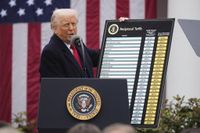Canada's stock market experienced a rollercoaster week, with the S&P/TSX Composite Index showing a significant decline on Thursday, April 3, 2025, following the announcement of new tariffs by U.S. President Donald Trump. The index opened lower at 24,474.92 points, down 3.29%, as fears of a global recession intensified due to the implications of the tariffs.
The previous day, on April 2, the market had closed up 273.90 points at 25,307.18, buoyed by investor optimism ahead of Trump's announcement. However, the mood shifted dramatically as details of the tariff regime emerged. Trump's plan included a base 10% tariff on most U.S. imports starting April 5, escalating to as high as 50% for certain countries beginning April 9. This sweeping executive order aimed to address the persistent U.S. goods trade deficits and was perceived as a direct threat to international trade relations.
In the wake of the announcement, the S&P/TSX composite index plummeted by 712.67 points to 24,594.51 in early trading on Thursday. The Dow Jones industrial average mirrored this trend, dropping 1,490.84 points to 40,734.48, while the S&P 500 and Nasdaq also saw significant declines of 218.66 points and 833.70 points, respectively. Economists expressed concerns that the new tariffs could drag the global economy into a recession.
"Today has been very, very volatile," said Pierre-Benoît Gauthier, vice-president of investment strategy at IG Wealth Management. He noted the tug-of-war between bullish and bearish investors, with uncertainty dominating the market. "The real effects of everything that’s going on are not yet known," he added, cautioning that the market's reactions should be interpreted with caution.
Despite the overall market decline, some individual stocks showed resilience. Superior Plus (TSX:SPB) surged by 8.1% to $7.11 per share after announcing upgraded growth targets at its 2025 Investor Day, where it projected a 17% compound annual growth rate in EBITDA per share through 2027. This optimism was largely driven by plans to repurchase about 40 million shares, which is expected to bolster free cash flow significantly over the next three years.
Bombardier, TFI International, and MDA Space also emerged among the top gainers on the Toronto Stock Exchange, each witnessing increases of at least 4.3%. In contrast, BlackBerry faced a sharp decline, falling over 9% to $4.86 per share after issuing a cautious outlook for fiscal 2026. Other notable losers included Aya Gold & Silver and BCE, both slipping by more than 4%.
Commodity prices were not spared from the fallout of the tariff announcement. The May crude oil contract fell by $5.08 to $66.63 per barrel, while the June gold contract decreased by $50.10 to $3,116.10 an ounce. The May copper contract also saw a decline, dropping 20 cents to $4.84 per pound. The Canadian dollar traded lower, at 71.20 cents U.S., down from 69.83 cents U.S. the previous day.
The impact of Trump's tariffs extended beyond immediate market reactions. Analysts pointed out that while Canada was not included in the harshest tariffs, a 25% levy on all foreign-made vehicles would still apply to Canadian auto exports. This aspect of the tariff plan raised concerns among Canadian automakers and could lead to further trade tensions.
Earlier in the week, prior to the tariff announcement, markets had shown signs of strength. The S&P/TSX composite index had closed at its highest level in over a week, reflecting a sense of optimism among investors. However, the uncertainty surrounding Trump's policies has shifted sentiment dramatically, leading to a significant sell-off.
The Canadian economy had already shown signs of strain, with data revealing that Canada unexpectedly swung into a trade deficit in February. Despite this, both exports and imports remained near record levels, as businesses prepared for the potential impacts of tariffs by building up inventories in the U.S.
As the situation continues to unfold, investors are left grappling with the implications of Trump's new tariffs. The uncertainty surrounding global trade relations, combined with the immediate market volatility, has created a challenging environment for investors and businesses alike.
Looking ahead, market analysts will be closely monitoring economic indicators, including upcoming jobs data, to gauge the potential impact of tariffs on the U.S. economy and, by extension, the Canadian market. A weaker jobs report could signal an imminent interest rate cut by the Federal Reserve, further complicating the economic landscape.
In summary, the Canadian stock market's recent performance illustrates the profound effects of political decisions on financial markets. With fears of a recession looming and uncertainties surrounding trade, investors are bracing for what lies ahead in this volatile economic climate.








